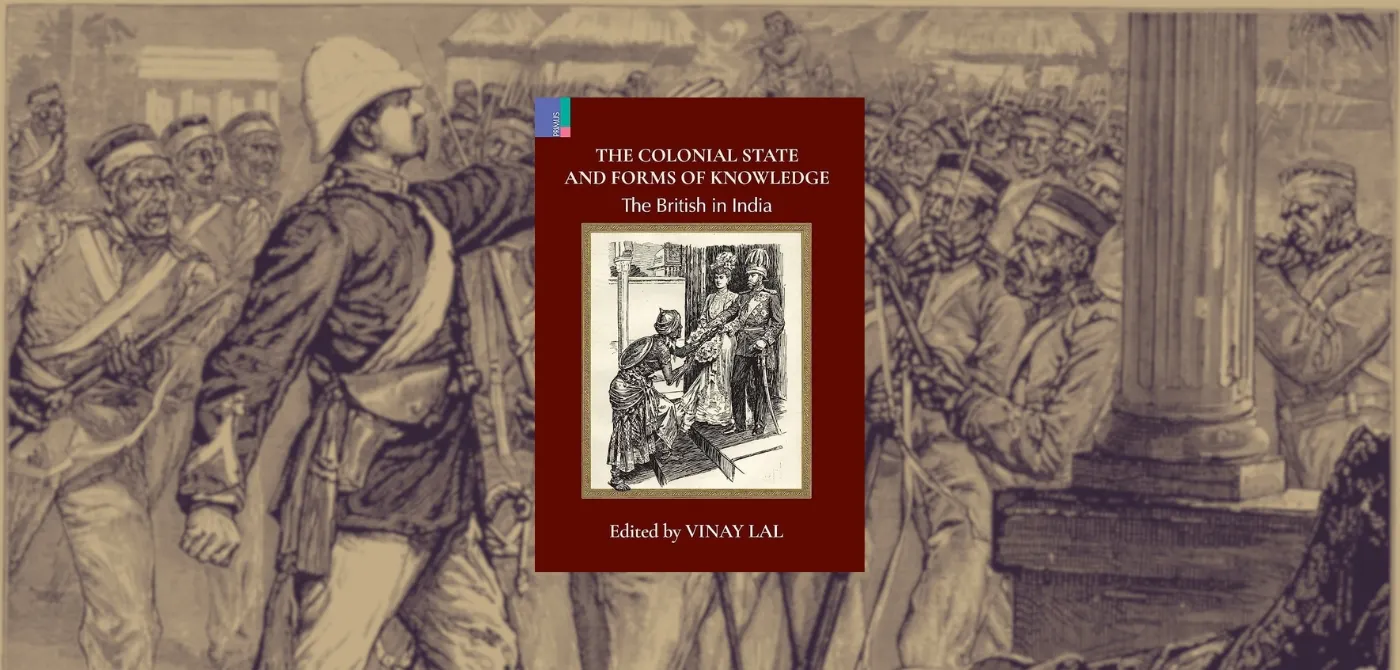Over the last few decades, roughly from the mid 1970s to the present, the field of colonial historiography has seen some valuable publications. With works such as Edward Said’s Orientalism (1978), Bernard Cohn’s Colonialism and its Forms of Knowledge (1996), and related works that sought to explore alternate genealogies of colonialism, such as C.A. Bayly’s Rulers, Townsmen, Bazaars (1983) and Empire and Information (1996), all have given us vast, interesting, and contending vignettes into the nature of colonialism. While these works have often fallen on various sides of the debate in asking questions about how totalising the nature of colonialism was, recent works have begun constructing more sophisticated and critical understandings of colonialism.
To reproduce colonialism’s own totalising narratives, one runs the risk of assuming that the voice one is reconstructing the past through, is the past itself. There is a fine distinction that needs to be made between two sets of historiographical statements, particularly when writing such a book, namely, a) that colonial knowledge was power, and b) that this power/knowledge was totalising. The question is whether the second statement necessarily follows from the first. The second statement hinges on how much it is reproduced in conversation, activism, discourse, political strategy, and in the last instance, historiography. In the set of essays that Vinay Lal has put together in The Colonial State and Forms of Knowledge, the distinction between these two considerations is not collapsed, but show colonialism as being complex, strange, and as un-totalising as any other facet of history.
Lal’s introductory essay provides the conceptual map to the rest of the work. He offers an analysis of the ways in which British colonial actors constructed knowledge of people whom they ruled over. The conceptual architecture of the book relies on the works of theorists and writers such as Bernard Cohn, Edward Said, and Michel Foucault. Lal reconstructs the discourses that British officials used to construct knowledge about India, much of which was armed with an Orientalist outlook (5).
The ultimate conceit of British colonial rule throughout the various territories that came under its grip was the juxtaposition between certain ways of seeing and of ruling.
Orientalism was, a lá Said, a sort of ‘textualist fetish’ that sought to access knowledge about South Asia solely through its texts – a mode of knowledge that eventually sustained the colonial project, and colonial rule. Colonial rule itself turned out to be a composite of three things, namely, “economic exploitation, military conquest, and political rule.” All these facets were in turn were sustained by the creation of a plethora of textual productions such as statistics, reports, gazettes (essentially, a form of announcing findings), the creation of legal codes and historical codes, tracts, and encyclopaedias.
The ultimate conceit of British colonial rule throughout the various territories that came under its grip was the juxtaposition between certain ways of seeing and of ruling. Ruling, for example, had much to do with the production of a discourse about ethical government, a discursive framework through which eastern potentates fell into moulded binaries of ‘Oriental Despot’ or not. Robert Orme (1728–1801), a historian of British India, would class Shivaji as having been a “humane sovereign, void of insolence or ostentation.” At the same time, Orme classed the vast majority of Indians as effeminate and pusillanimous, given not only their poor diet and physiognomy, but also, the enervating climate. Whether this was true is a question well-worth asking. It nonetheless became true of British ways of seeing – particularly, ways of seeing that sought to complete the operation of converting doxa (opinion) into episteme (truth).
As a historical form of government, the idea of an Oriental Despot, which came to mostly use Aurangzeb (1658-1707) as a ‘type’ within commentaries on such a configuration, rested simply on the corollary that the sovereign was all-powerful, and controlled all lands under his reign, and conversely, that there was no private property among the people. Naveen Kanalu’s essay traces the idea of Oriental despotism itself through its various iterations. Kanalu reconstructs the shared ideas between French and British writers here, such as Baron de Montesquieu (1689-1755), Anquetil-Duperron (1731-1805), Alexander Dow (1735-79), and James Mill (1773-1806). Of these, it was perhaps only Anquetil-Duperron who questioned the trope of the Oriental Despot, or at the very least, asserted that Aurangzeb did not fit the mould of one – something he berated Dow for.
Much of this analysis of ‘literary empiricism’ affords the reader is an appreciation of how difficult it is separate forms of knowledge from realities they represented.
European knowledge of South Asia constructed during the 18th and 19th centuries seem to be stitched together through ethnographies, travelogues, literary renderings, and memoirs. These genres did not present isolated forms. Matthew Reeck analyses how in the memoirs of the French scholar Garcin de Tassy’s (1794-1878) empirical reality was made to speak to literary commentary. Mémoire sur les particularités de la religion musulmane dans l’Inde was culled from various travelogues and literary sources, selected so as to be able to ‘touch’ the empirical reality of Indian Islamic religiosity, a method of reading that Reeck terms “literary empiricism.” What much of this analysis of ‘literary empiricism’ affords the reader is an appreciation of how difficult it is separate forms of knowledge from realities they represented. If mots and choses – ‘words’ and ‘things’ – share problematic relationships, de Tassy’s attention to detail borne of his philological inclinations is all the more laudable. Text and context often form composite wholes, in which case, de Tassy’s critical eye invested in discerning minute slippages in translation and transliteration of texts he received, offer us ways of questioning our own theories. To extend Reeck’s observations, theoretical, or political empiricism remains a valuable tool in, as mentioned in the introduction to this piece, questioning colonialism’s own totalising narratives.
Colonial administrator/scholars were often aware of the limits of racial and ethnic classificatory schemes, yet they nonetheless attempted to ‘fit’ amorphous realities into bounded forms. Hannah Carlan’s essay takes up G.A. Grierson’s Linguistic Survey of India (LSI) to discuss how the survey bound language and social identity together through interpretations of literature and ethnicity.
Any of the movements towards linguistic regionalism and majoritarianism in the nationalist and post-partition periods can be traced back to colonial projects which sought to ‘bind’ languages to forms of ethnicity and race.
The LSI had to begin with ‘naming’ unitary languages. What is productive about her analysis is the discussion of the contradictions in Grierson’s work. “The constant fluctuation between Grierson’s desire for scientific exactitude and his recognition of the socially constructed nature of categories is a reflection of ‘the contingent and often fractured nature of colonial knowledge.” To anyone familiar with the State Reorganization Committee reports, the continuing confusions involved in classification are not a far cry from Grierson’s own preoccupations thought. Any of the movements towards linguistic regionalism and majoritarianism in the nationalist and post-partition periods can be traced back to colonial projects which sought to ‘bind’ languages to forms of ethnicity and race.
These mechanics of binding knowledge to objective reality was itself a complex process. Technocratic imperatives, a reliance on statistics, and pretensions to ‘completeness’ often allowed resignification of places into ‘carto-statistical techniques’ of government. Colonial gazetteers redefined Himalayan spaces, for instance, were redefined by colonial gazetteers according to ‘great’ or ‘classical traditions’ by simultaneously ‘displacing’ folk traditions. As Nivedita Nath shows, the problem was that this reclassification often elided the rich interactions that folk histories which recognised the rather denser connections between places such as Nepal and Tibet. ‘Orographical’ forms of knowledge, designated spaces in the Kumaun-Garhwal region (now in Uttarakhand) as having an ‘Indian character’ distinct from its adjoining Tibetan geography, as seen in Edwin Atkinson’s Gazetteer of the Himalayan Districts of the NWP (219). Orography often became an extension of ethnicity, in which Hindu hill-men (Khasas) were separated off from their Tibetan neighbors (Bhotas) in a region that essentially enjoyed the free movement of people.
Conclusion
Given that much of these ways of being, and seeing, continued into independent India, how does one not reduce oneself to a mirror image of colonial knowledge? The second part of Lal’s introduction fruitfully struggles with the question of locating nationalist thought “in an epistemology or cultural practice that is not merely derivative and mimetic.” How indeed does one speak of modern South Asia without reducing it to an imprint of 19th century British colonialism?
One way is to afford even a late 18th and 19th century colonial discourse its own cracks and fissures and recognize its own pastiches and amnesia regarding its own myriad administrative continuities with late Mughal India, and cultural borrowings from its other myriad colonies (and, from other colonial powers) around the world.
The thousands of voices that perhaps spoke, but were not heard, or that spoke, but in a different language, and with a different logic, must be excavated.
Colonial mythographies end up reproducing colonialism’s own myths of omnipotence and omniscience. The labour of writing histories of colonialism, then, lies in seeing the cracks in the mirror, or, to mix metaphors, missing the forest for the trees. The thousands of voices that perhaps spoke, but were not heard, or that spoke, but in a different language, and with a different logic, must be excavated, since for every programmatic voice of colonial knowledge which asked people to walk a straight line, there are the various other voices that asked to meander.
Questioning colonial forms of knowledge, and by extension, colonialism, has never been a luxury. The purpose of this review is not to misrepresent the arguments the six authors have so painstakingly furthered. Rather, in elevating the fissures and cracks, and reconstituting the dialogic element to the colonial state and forms of knowledge by reading this book, this review hopes to allow for the emergence of a space, even within the seemingly concrete logic of colonialism, for the cracks to be seen, and for other voices to be heard.
Vipin Krishna is completing a PhD in history at the University of California, Los Angeles.









